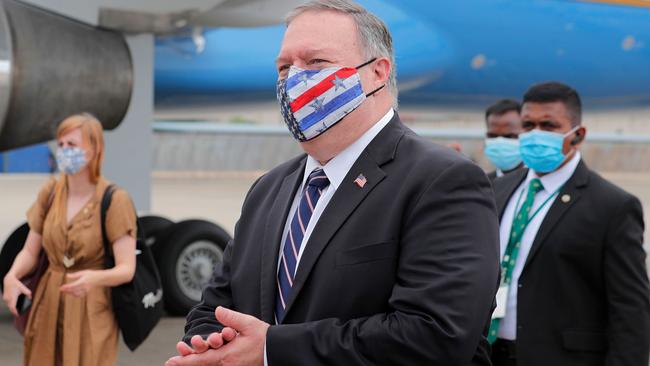Mike Pompeo tells Sri Lanka to spurn ‘predator’ China
US Secretary of State Mike Pompeo has urged Sri Lanka to reject the bad deals and lawlessness of the ‘predator’ Chinese Communist Party.

US Secretary of State Mike Pompeo has urged Sri Lanka to reject the bad deals and lawlessness of the “predator” Chinese Communist Party as he continued his five day “anti-China” roadshow across South and Southeast Asia on Wednesday.
Less than a week out from the US presidential elections, Mr Pompeo told a Colombo news conference: “We see from bad deals, violations of sovereignty and lawlessness on land and sea that the Chinese Communist Party is a predator, and the US comes in a different way — we come as a friend, and as a partner.”
Mr Pompeo was expected to discuss a$US480m infrastructure fund for Sri Lanka during the visit as well as convince the China-friendly Rajapaksa regime to renew its Status of Forces Agreement with the US military, a critical peg in America’s Indo-Pacific strategy.
Beijing has lashed out at the US over its top diplomat’s visit, accusing it of bullying smaller nations while underlining its own practical co-operation with neighbouring countries.
China’s Sri Lanka embassy on Tuesday accused the US of bullying the Indian Ocean nation after a senior State Department official told reporters Colombo must make “difficult but necessary choices” over its economic ties with Beijing.
“We are firmly opposed to the US taking the opportunity of the State Secretary’s visit to sow and interfere in China-Sri Lanka relations, and to coerce and bully Sri Lanka,” the statement read.
On Wednesday, China’s ambassador to Indonesia, Qiao Xian, hailed the two nations’ “true friendship in difficult times”, noting Jakarta’s deployment of medical supplies to China at the outset of the coronavirus outbreak and Beijing’s pledge to provide early COVID-19 vaccines — a stark contrast with the US, which has hoarded its vaccines. Mr Qiao warned that China would “guard against any attempt to interfere or undermine the friendship between China and Indonesia (and) … resist external interference”, in an article in the Jakarta Post
Mr Pompeo’s visit to India, Sri Lanka, the Maldives and Indonesia is aimed largely at rallying a push-back against Chinese aggression in the Indo-Pacific, as well as its so-called debt trap diplomacy of smaller nations.
Sri Lanka and the Maldives are heavily indebted to China for expensive infrastructure projects, leaving them potentially vulnerable to diplomatic pressure.
Colombo was forced to hand over its Hambantota port to a Chinese state-owned company on a 99-year lease because it couldn’t service the debt. India has recently pledged more than $US2bn to the Maldives, which now owes Beijing at least $US1.4bn.
In Indonesia, where on Thursday Mr Pompeo will address the youth wing of the largest Muslim organisation, Nahdlatul Ulama, after meeting with President Joko Widodo and Foreign Minister Retno Marsudi, there is speculation his visit could be aimed at convincing Jakarta to follow the UAE and Bahrain in establishing formal diplomatic ties with Israel.
“Indonesia would be a huge trophy for Israel (and the US) as the nation with the world’s largest Muslim population and most consistent defender of Palestine,” one analyst told The Australian.
Many suspect Mr Pompeo’s anti-China message will fall flat in Jakarta, which maintains a strict non-alignment policy.
Dino Patti Djalal, a foreign policy expert and former Indonesia ambassador to the US, told The Australian America’s rising anti-China rhetoric was “making Southeast Asians uncomfortable because China is more relevant than ever for economic, vaccine and public health reasons”.
“The most immediate interest for Southeast Asians is economic rebound.
“If the Americans come shouting about something that isn’t relevant to those immediate interests, it is going to be the wrong message.
“The right message is: ‘How can we help you? We are here for the long-term.’ ”
By contrast, Mr Pompeo’s message was warmly received in New Delhi on Tuesday where the two countries signed the last of four “foundational” military agreements and heralded their closer ties. Before leaving India, Mr Pompeo said the world faced a “battle between freedom and authoritarianism”, and the US would stand with its partners against Chinese “tyranny”.




To join the conversation, please log in. Don't have an account? Register
Join the conversation, you are commenting as Logout